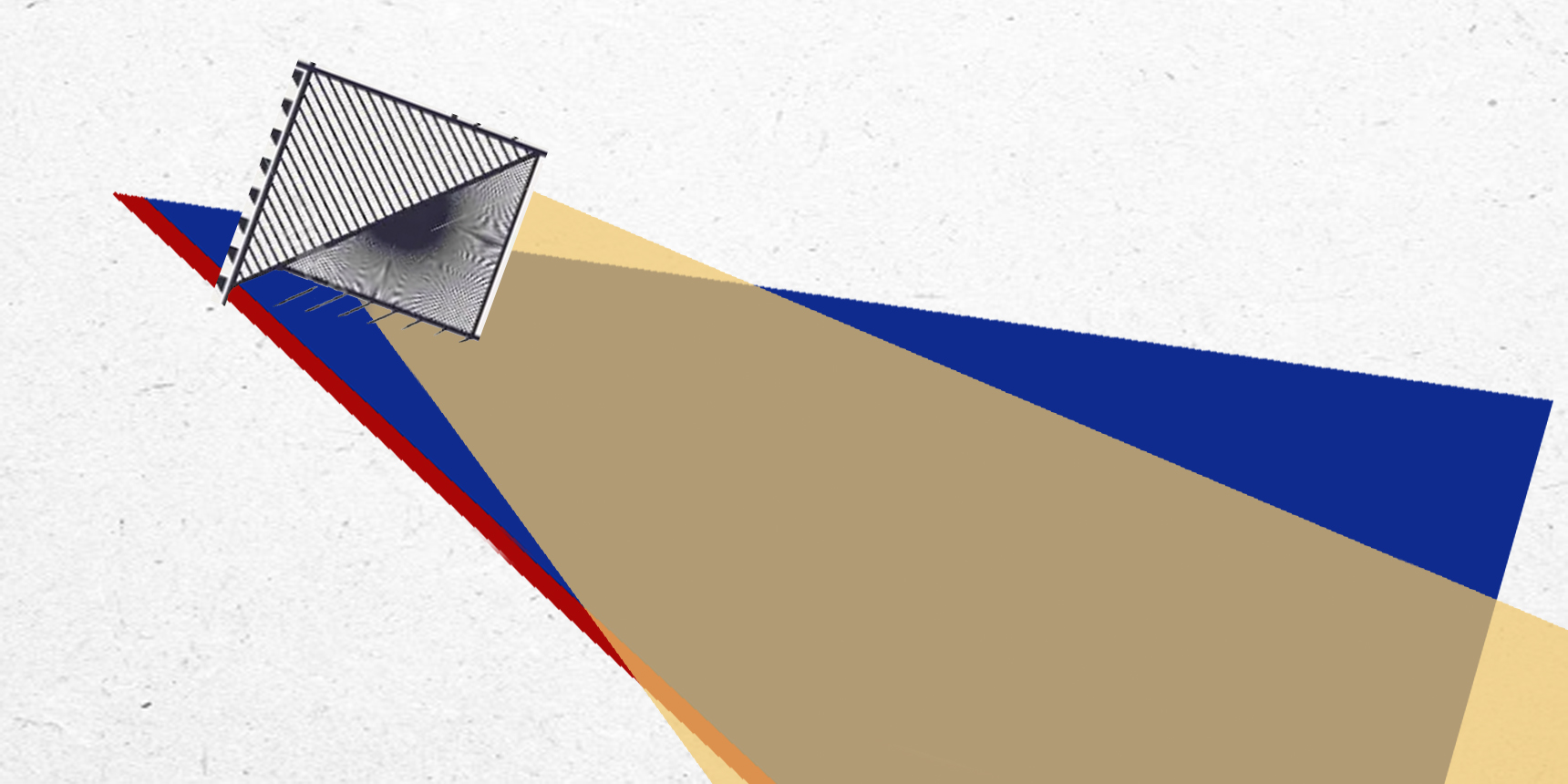
Recent polls reveal that there is a growing sense of distrust within Armenian society regarding the country’s long-standing alliance with Russia. The perceived lack of action by Russia in response to multiple instances of Azerbaijani incursions into Armenian territory since 2021 and the ongoing blockade of the Lachin Corridor since December 2022, have significantly eroded its reputation among ordinary Armenians. Russia is no longer perceived as Armenia’s primary political and security partner and a growing minority has even come to see it as a threat.
Although Armenia-Russia relations were never without their challenges, prior to 2021, Russia consistently held the position of being viewed as Armenia’s foremost ally, friend, and partner across various domains such as politics, economics and security, as indicated by numerous polls. Less than a decade ago, pro-Kremlin sentiments in Armenia ran so incredibly high that in a 2015 poll, Armenians were more approving of President Vladimir Putin (79%) than Russians themselves (72%).
In a series of polls conducted by the International Republican Institute (IRI) in 2006–2007, during the last years of Robert Kocharyan’s presidency, almost 90% of respondents viewed Russia as a trustworthy ally. Even as recently as August 2018, nearly 80% of respondents held the same view, including 37% who said Russia is a “very trustworthy” ally and 42% calling it “somewhat trustworthy”. Although this specific question was not included in more recent polls, the IRI has posed other questions in their post-2018 surveys, which highlight a decline in Armenia’s perception of Russia.
The first question asks respondents to evaluate the state of Armenia–Russia relations. In polls conducted between 2006 and 2008, an overwhelming majority, ranging from 93% to 98%, considered Armenia-Russia relations to be “good.” As recently as in 2018 and 2019, between 87% and 93% expressed the same sentiment. Subsequently, the figures took a downturn, declining to 70% in May 2021, further dropping to 64% by December 2021, and reaching an all time low of 50% in the most recent poll conducted between January and March 2023. Now 49%, say the relations between the two countries are “bad.”
Lack of any substantial response by Russia to the Azerbaijani incursions into Armenia in May and November of 2021 and September 2022 likely contributed the most to this significant shift in numbers.
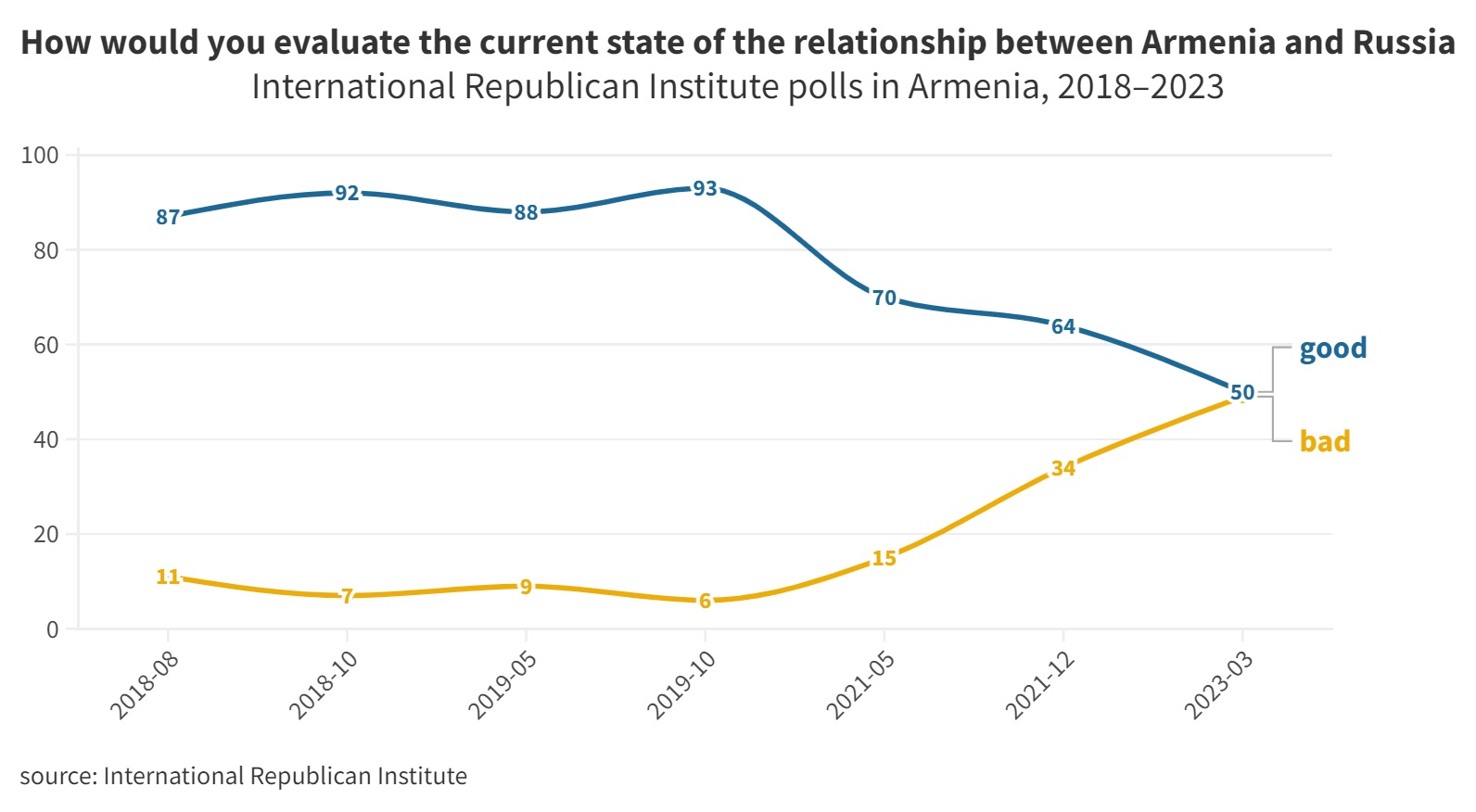
No Longer Best Friends
Another polling firm, the Caucasus Research Resource Centers (CRRC), has been conducting annual surveys known as the Caucasus Barometer in Armenia since 2008. Beginning in 2011, respondents were asked to identify the country they consider to be Armenia’s “biggest” or “main friend.”
In the first poll conducted in 2011, a significant majority of 81% designated Russia as Armenia’s primary friend. However, this percentage dropped to 63% by 2017. In the most recent survey, conducted between December 2021 and February 2022, Russia’s perception suffered a significant decline, resulting in a loss of its leading position to France. Among the respondents, 37% considered France as Armenia’s main friend, while Russia garnered only 34%. Furthermore, 19% of the respondents expressed the belief that Armenia has no friends.
Demographic groups more likely to perceive Russia as Armenia’s main friend included rural residents (41%), people older than 55 (42%), and supporters of the two parliamentary opposition alliances (48%). Even among people who see the collapse of the Soviet Union as a bad thing for Armenia, only 39% regarded Russia as the primary friend, while 33% identified France.
Contextually, more than a decade of consistent polling on Armenian society’s high approval of Russia was robustly ruptured within a one year period. This significant erosion clearly aligns with the broader decline in Russo-Armenian relations, denoting that the rupture is not simply between Yerevan and Moscow, but also among large swaths of Armenian society.
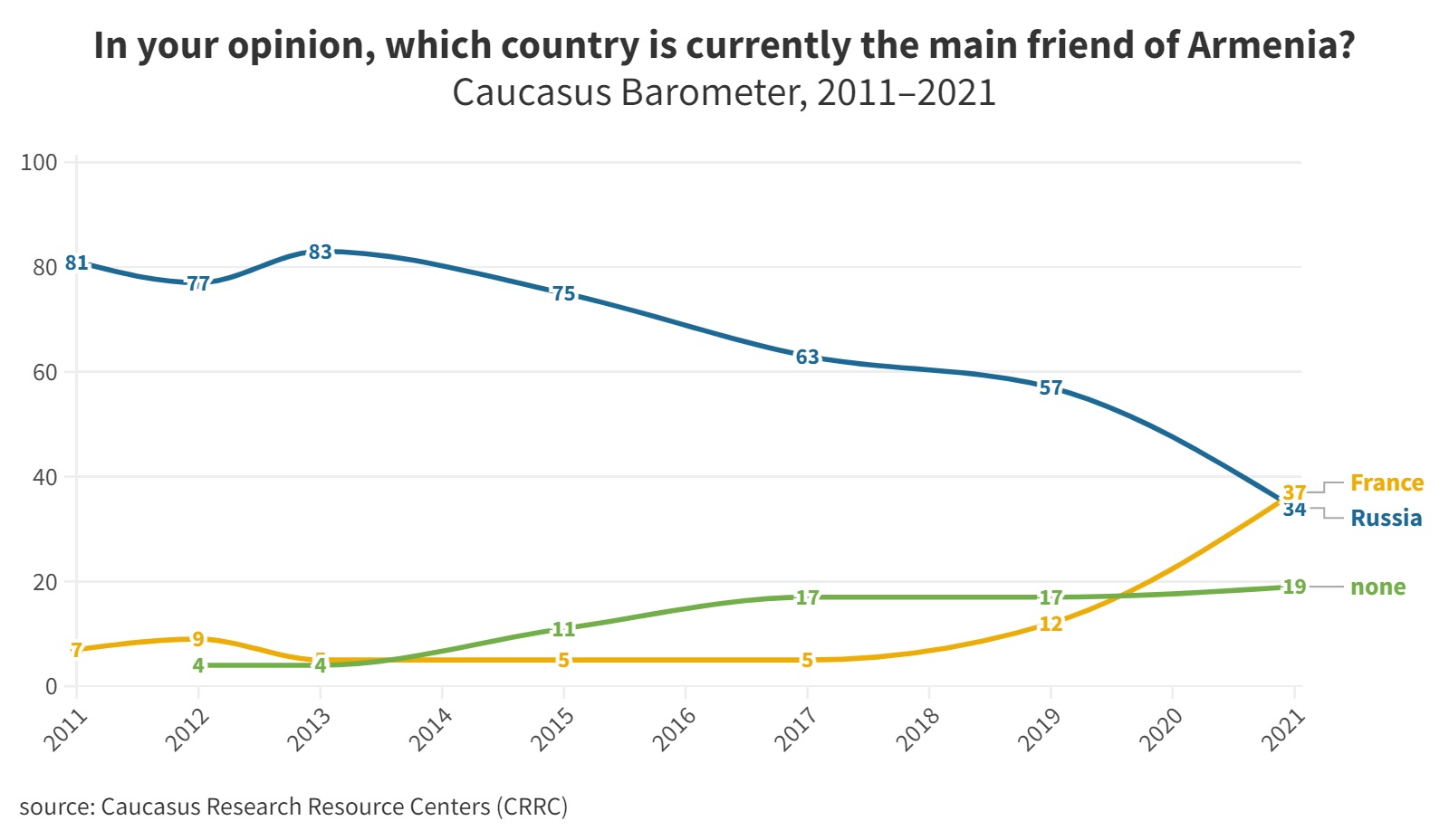
Another question asked by the IRI has aimed to identify the countries perceived as Armenia’s primary political partners and greatest threats. Russia consistently emerged as Armenia’s foremost political partner, which came as no surprise. In the late 2000s, an overwhelming majority of respondents, up to 95%, regarded Russia as Armenia’s most crucial partner. The perception of Russia as the greatest threat to Armenia remained in the single digits during that period. More than a decade later, in the 2018 and 2019 polls, 78% of participants still considered Russia as Armenia’s primary partner, while 11-12% identified it as the greatest threat. In the most recent IRI poll, conducted earlier this year, the proportion of respondents viewing Russia as the most important partner decreased to half, while a quarter considered it the greatest threat to Armenia.
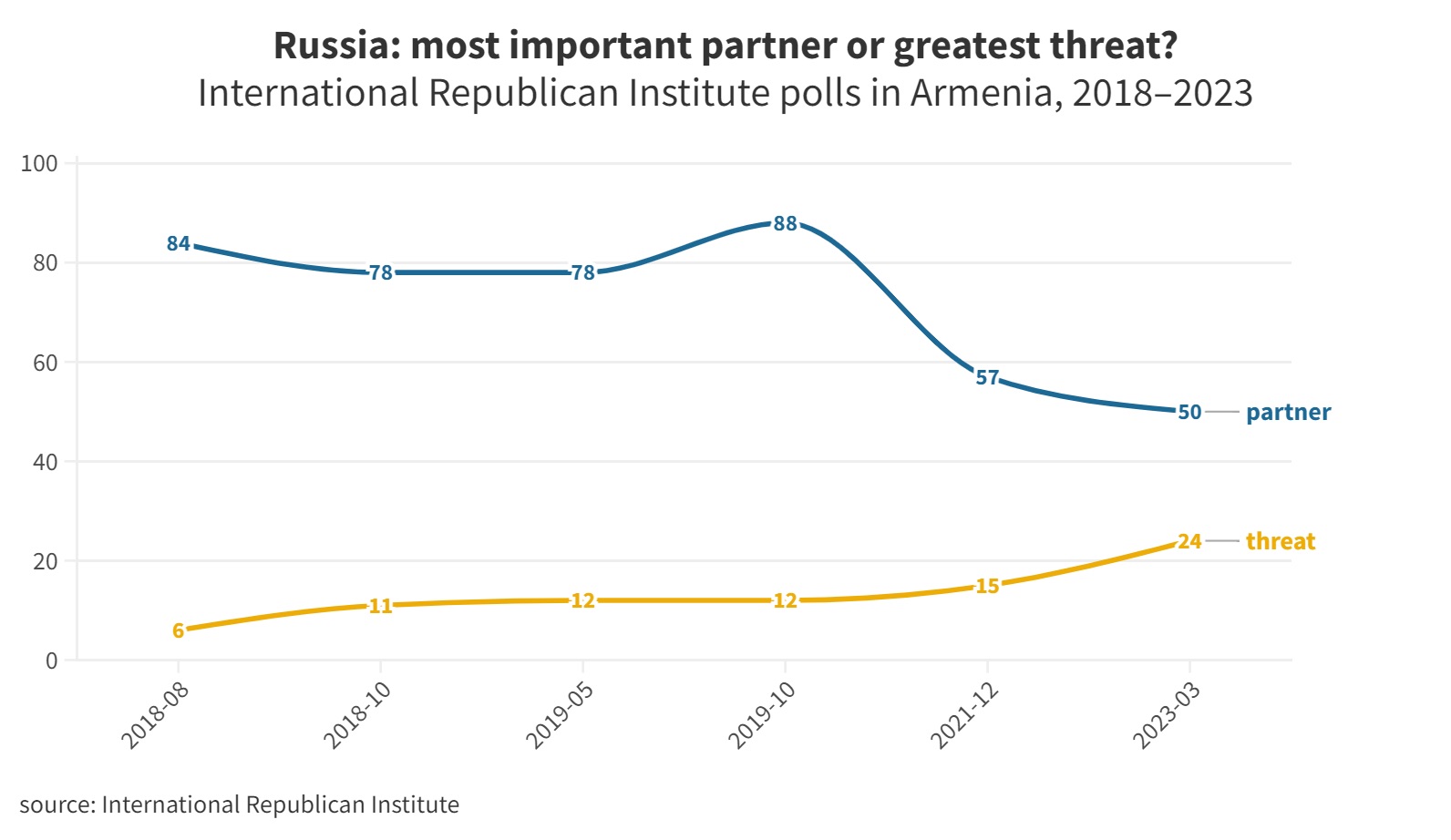
Prospective Allies
Russia’s perceived unwillingness to assist Armenia and fulfill its treaty obligations during times of crisis has compelled both the Armenian government and the general public to seek new allies. France, the United States, the European Union, and Iran have emerged as potential frontrunners.
In polls conducted by IRI in May 2019 and early 2023, notable shifts have occurred regarding the perceived importance of various partners for Armenia. Participants were asked to name countries they consider to be Armenia’s most important political partner. They could select several countries. As indicated earlier, Russia’s standing has dramatically declined from consistently being around or above 80% in 2018-2019 to now standing at 50%.
France has now assumed the position of Armenia’s most crucial partner, with 75% of respondents considering it as such — a significant increase from 46% four years ago. The percentage of Armenians who view Iran as the country’s partner has nearly tripled, rising from 24% to 67%. Meanwhile, the United States has doubled its support, growing from 27% in 2019 to 52% presently. The European Union’s share remains more modest at 36%. These shifts reflect the vocal support expressed by these countries and the EU in upholding Armenia’s territorial integrity and sovereignty. In Iran’s case, its tense relations with Azerbaijan also contributed to the perception as an ally of Armenia.
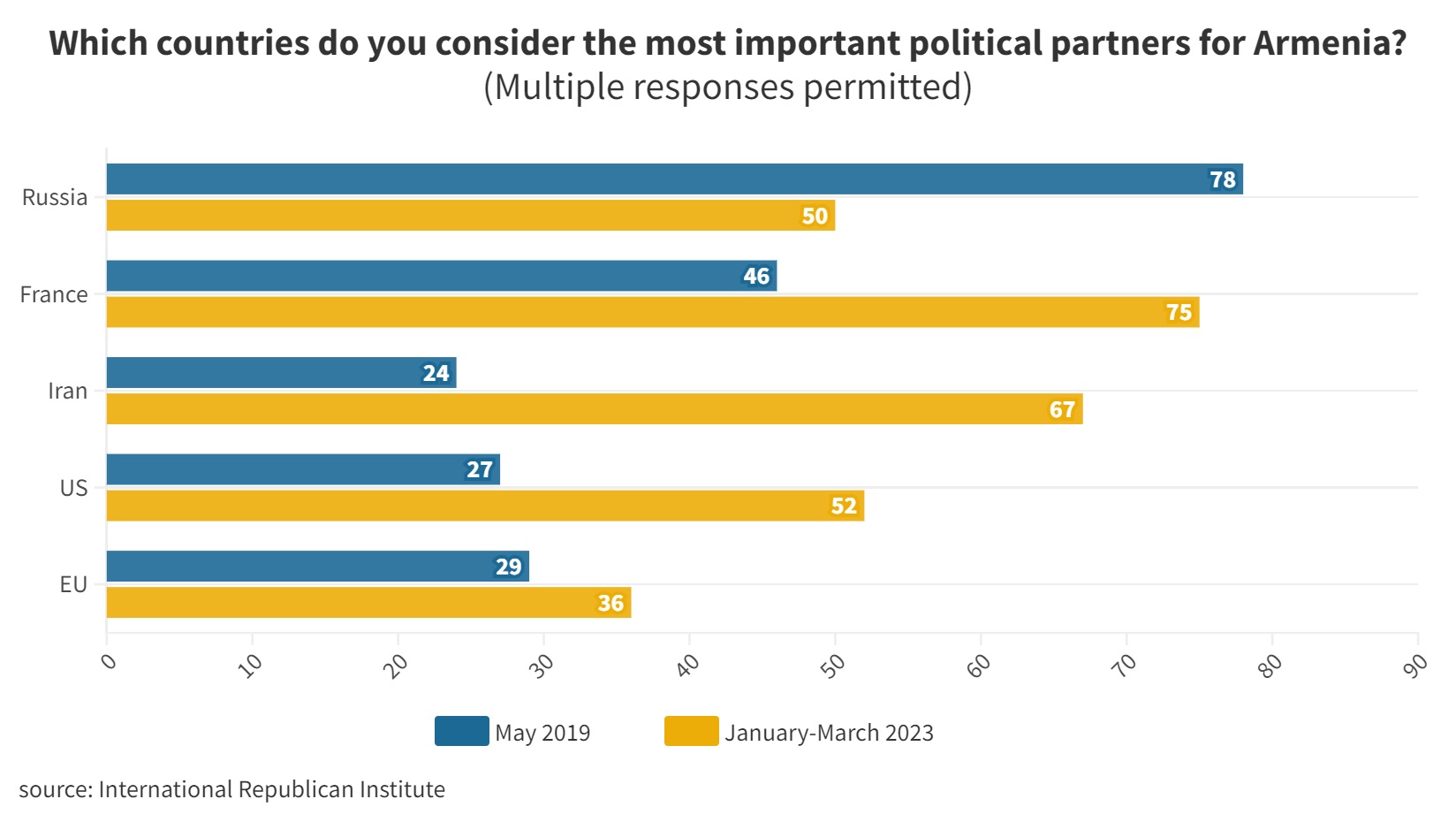
These polls, especially the most recent ones, show a seismic shift in Armenians’ perception of Russia, accompanied by a noteworthy increase in favorable attitudes towards both France, the United States and Iran. It comes as a natural response to Russia’s failure to fulfill its commitments toward Armenia, including upholding the country’s territorial integrity and maintaining open access via the Lachin Corridor as outlined in the November 2020 statement.
In stark contrast, the United States, France, and the EU have been unequivocal in their strong diplomatic support for Armenia’s sovereignty and their condemnation of the blockade of Artsakh. American diplomatic intervention played a crucial role in halting Azerbaijan’s incursion into Armenia in September 2022, while the EU has deployed a civilian observer mission to deter further advances by Azerbaijan. On the flip side, Russia not only failed to intervene significantly during the September 2022 events or the blockade of the Lachin Corridor but also neglected its obligation to deliver the weapons that Armenia had paid for, exacerbating the country’s precarious security situation.
EVN Media Festival
May. 26, 27, 28
See full program
See guest speakers
Register
Also see
The Italian Media’s Relation With Armenia and Azerbaijan
Although Italy and Armenia have a long history of ties, Italy’s current economic interests and choice of strategic partners leave little room for maneuver in support of Armenia or Artsakh.
Read moreOld Neighbors, New Realities
Iran will never accept any Azerbaijani military or political control of southern Armenia. While Tehran is pursuing a policy of strategic patience vis-à-vis Azerbaijan, it does have red lines that, if crossed, would likely produce a swift reaction.
Read moreArmenia-Turkey Relations Hostage to Azerbaijan
Regardless of efforts to normalize relations between Armenia and Turkey, it is clear that as long as the Armenian-Azerbaijani conflict remains unresolved, Armenian-Turkish relations will be held hostage to it. Hranoush Dermoyan explains.
Read moreJacques Faure: Two Wars Pitting a Democracy Against an Autocracy
An interview by Gaidz Minassian with former French Co-Chair of the OSCE Minsk Group and former French Ambassador to Ukraine, Jacques Faure, who discusses the Ukraine-Russia and Armenia-Azerbaijan wars.
Read moreThe Biden Doctrine Comes to Armenia
Azerbaijan has made an enormous strategic mistake, Russia has allowed for a sizable power vacuum in the region, and the United States has determined to capitalize on these developments, undertaking a policy pivot in the South Caucasus.
Read moreThe Calamitous 1921 Treaty of Kars
The Treaty of Kars was signed under difficult geopolitical conditions. Turkey was able to use the “threat” of normalizing its relations with the West to extract maximum concessions from the Russian side, mainly at the expense of Armenia.
Read moreThe Calamitous 1921 Treaty of Moscow
The Treaty of Moscow reaffirmed, almost identically, the borders laid out in the Treaty of Alexandropol. Armenia, thus, conceded 20,000 square kilometers to Turkey. Mikayel Yalanuzyan reveals the details of those turbulent times.
Read more





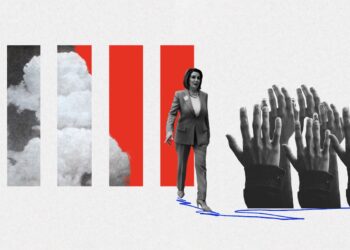



The 2020 war was permitted/encouraged by Russia.
The blockade of Artsakh is permitted/encouraged by Russia.
The Azeri attacks and occupation of parts of Armenia are permitted/encouraged by Russia.
Why not just come out and state the obvious? That Russia is doing these things because it fears that Armenia is headed west, which would create an existential crisis for Russia.
Also, when is someone also going to point out that the US and Europe (including France) have done very little to discourage Azerbaijan and Turkey’s attacks, and that historically (over 100 years) the West has not provided military aid to help Armenians?
In short, when are we going to stop lying to ourselves?
In America we call this “beating around the bush.”
Armenia learned hard lessons over the past 30 years. You can’t outsource your own defense and you can’t have a leadership class that builds the wealth of a few at the expense of many.